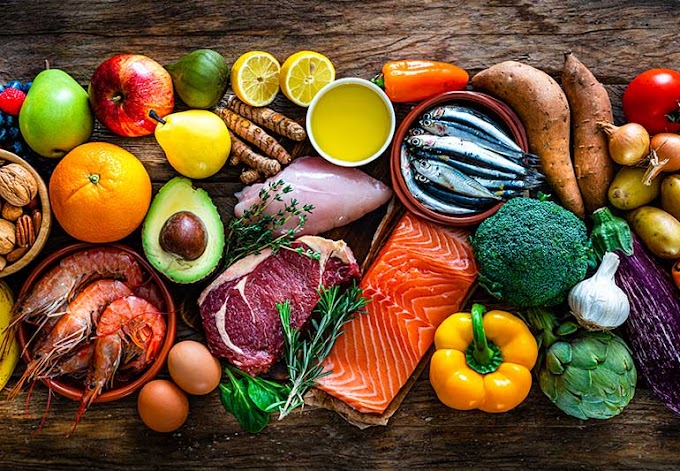Embracing Sustainable Choices
Making sustainable eating a seamless part of your lifestyle isn't just a trend, it's a conscious choice that benefits both your health and the planet. Let's explore valuable tips from dietitians to cultivate a healthier you while contributing to a greener world.
Diversify Your Plate with Colorful Plants
Dietitians recommend a plant-centric diet as a cornerstone of sustainable eating. Fill your plate with a vibrant array of fruits and vegetables, embracing the diverse colors nature provides. Experiment with plant-based recipes to discover the rich tapestry of flavors that come with incorporating more greens into your meals.
Choose Locally Sourced and Seasonal Produce
Support local farmers and reduce your carbon footprint by opting for locally sourced and seasonal produce. Dietitians emphasize connecting with your community's agricultural offerings. Explore farmers' markets or consider joining a community-supported agriculture (CSA) program to access fresh, seasonal delights while fostering a sustainable food ecosystem.
Sustainable Proteins
Protein is crucial in a balanced diet, and dietitians recommend sustainable options like legumes, nuts, and plant-based proteins. For meat enthusiasts, explore ethically sourced and responsibly raised meat products to align with both your health and the planet's well-being.
Minimize Food Waste with Mindful Planning
"Waste not, want not" is a mantra dietitians champion for sustainable eating. Plan meals thoughtfully, purchase only what you need, and repurpose leftovers into creative, delicious dishes. Minimizing food waste contributes to a more sustainable food system while saving money and resources.
Embrace Whole Foods and Limit Processed Items
Dietitians advocate for a return to basics by emphasizing whole, minimally processed foods. Incorporating more whole grains, fresh fruits, and vegetables into your diet boosts nutritional intake while reducing the environmental impact associated with heavily processed, packaged items.
Stay Hydrated Sustainably
Hydration is vital for a healthy diet, and dietitians recommend sustainable choices even in beverage selection. Opt for reusable water bottles and consider water filtration systems to reduce reliance on single-use plastic bottles. Small changes in hydration habits contribute to significant environmental benefits.
A Nourished You, a Thriving Planet
The wisdom of dietitians unveils a path to sustainable eating that not only nourishes your body but also contributes to the well-being of our planet. Integrate these tips into your lifestyle, transforming your relationship with food into a holistic journey supporting your health and fostering a sustainable future. As you embark on this conscious culinary adventure, relish the flavors of wholesome, earth-friendly choices that align with both yourself and the world around you.
Mindful Consumption of Seafood
When it comes to sustainable eating, dietitians emphasize the importance of choosing seafood wisely. Look for responsibly sourced options certified by reputable organizations like the Marine Stewardship Council (MSC). Inquire about the origin of seafood at restaurants or when shopping to make informed choices supporting your health and the health of our oceans.
Cultivate Your Own Edible Garden
For those with a green thumb, dietitians encourage cultivating your own edible garden. Growing your herbs, fruits, and vegetables allows you to have a direct hand in your food production. Embark on this gardening journey, connecting with the earth and enjoying the freshest, locally sourced produce right from your backyard.
Read Labels Critically
Dietitians are avid advocates for becoming savvy label readers. When shopping, scrutinize product labels for information on sourcing, production methods, and ethical practices. This empowers you to make choices aligned with sustainable principles and avoid products that may contribute to environmental degradation.
Educate and Inspire Others
As you embark on your sustainable eating journey, dietitians encourage you to share your knowledge and experiences with others. Engage in conversations about the benefits of sustainable eating, inspire friends and family to make conscious choices, and contribute to a collective effort towards a healthier, more sustainable future.
A Sustainable Feast for Body and Planet
In the grand tapestry of sustainable eating, dietitians weave a narrative that extends beyond individual well-being to encompass the health of our planet. As you adopt these tips into your lifestyle, envision a future where each meal becomes a celebration—a sustainable feast that nourishes not only your body but also the Earth we call home.
A Holistic Approach to Well-being
In the realm of sustainable eating, the journey transcends the boundaries of mere nutrition. Dietitians underscore the importance of adopting a holistic approach—one that encompasses not only the foods you consume but also the values you uphold. Here are additional insights to round out your sustainable eating experience:
Community Involvement
Dietitians emphasize the power of community in fostering sustainable eating habits. Engage with local initiatives, community gardens, or sustainable food events. By building connections and sharing knowledge within your community, you contribute to a broader movement towards a healthier, more sustainable food culture.
Mindful Cooking Practices
Sustainable eating extends to how you prepare your meals. Dietitians advocate for mindful cooking practices, such as minimizing energy consumption, reducing water waste, and utilizing locally sourced ingredients. Embrace the joy of cooking with an eco-conscious mindset, turning each meal preparation into an act of respect for both your health and the planet.
Educate Yourself Continuously
The landscape of sustainable eating is ever-evolving. Dietitians encourage a continuous journey of education. Explore books, articles, documentaries, and reputable websites to stay informed about the latest developments in sustainable agriculture, ethical food practices, and innovative solutions for a greener future.
Balance and Flexibility
While the principles of sustainable eating offer a robust framework, dietitians also stress the importance of balance and flexibility. Navigate through various dietary approaches, adapting them to your individual needs and preferences. Sustainable eating should enhance, not restrict, your culinary experiences.
A Sustainable Legacy
Envision your sustainable eating journey as a legacy—one that transcends personal benefits to leave a positive imprint on the planet. By incorporating these insights from dietitians into your lifestyle, you're contributing to a sustainable legacy that spans generations.
Savor the flavors of this journey, knowing that each bite holds the potential to nourish not only your body but also the Earth. Your choices ripple into a collective wave of positive change, fostering a world where sustainable eating isn't just a choice; it's a way of life—a legacy we proudly pass on to those who follow in our footsteps.
Mindful Eating Practices
Dietitians emphasize the importance of mindful eating as a core aspect of sustainable well-being. Slow down, savor each bite, and be present during meals. This practice not only enhances your appreciation for food but also allows you to recognize when you're truly satisfied, reducing the likelihood of overeating.
Physical Activity and Sustainable Living
Extend the principles of sustainability beyond the plate by incorporating physical activity into your routine. Dietitians advocate for a balanced lifestyle that includes regular exercise. Whether it's a nature walk, a workout routine, or recreational sports, staying active contributes to both personal health and a sustainable mindset.
Culinary Creativity and Sustainable Flavors
Dive into culinary creativity to make sustainable eating exciting and diverse. Experiment with herbs, spices, and flavors to enhance your meals. Dietitians encourage exploring local, sustainably sourced ingredients to support regional agriculture and enjoy a unique taste that aligns with the principles of conscious consumption.
Embracing Food Diversity
Celebrate the diversity of foods available to you. Dietitians suggest incorporating a wide range of fruits, vegetables, grains, and proteins into your diet. This not only provides a broad spectrum of nutrients but also supports agricultural biodiversity, contributing to a resilient and sustainable food system.
Reducing Single-Use Plastics
Beyond food choices, dietitians highlight the importance of minimizing single-use plastics. Embrace sustainable practices by using reusable bags, containers, and utensils. This small shift in lifestyle choices aligns with a holistic approach to sustainability, considering the environmental impact of daily habits.
Connecting with Food Sources
Gain a deeper understanding of where your food comes from. Dietitians encourage visits to local farms, participating in community-supported agriculture programs, or even growing your own produce. Connecting with food sources fosters a sense of appreciation for the journey from farm to table, reinforcing the sustainability narrative.
Balancing Nutritional Needs
While focusing on sustainable choices, dietitians stress the need to balance nutritional requirements. Ensure that your dietary choices provide essential vitamins, minerals, and macronutrients. If needed, consult with a dietitian to tailor your sustainable eating plan to meet your unique nutritional needs.
Holistic Self-Care
Sustainable well-being goes beyond nutrition; it includes holistic self-care. Prioritize sufficient sleep, manage stress through mindfulness practices, and cultivate a positive mindset. Dietitians recognize that a holistic approach to well-being encompasses mental, emotional, and physical health.
Educate and Advocate
Become an advocate for sustainable eating by sharing your knowledge. Dietitians encourage individuals to educate their communities about the benefits of conscious consumption. Engage in conversations, attend local events, and be a positive influence on others to contribute to a broader movement toward sustainable living.
Reflect and Adapt
Dietitians emphasize the importance of reflection and adaptability. Regularly assess how your sustainable eating practices align with your values and well-being. Be open to refining your approach based on new information, evolving goals, and changing circumstances.
Celebrating Progress, Not Perfection
In the pursuit of sustainable well-being, dietitians remind us to celebrate progress rather than striving for perfection. Every positive choice, no matter how small, contributes to a healthier you and a more sustainable world. Embrace the journey with a sense of accomplishment and joy.
As you integrate these insights into your lifestyle, envision a comprehensive tapestry of well-being that encompasses mindful eating, physical activity, culinary creativity, reduced environmental impact, and a holistic self-care approach. Your commitment to sustainable living creates a positive ripple effect, inspiring others to join in the journey toward a healthier, more sustainable future. Cheers to a life well-lived in harmony with both personal and planetary well-being!









